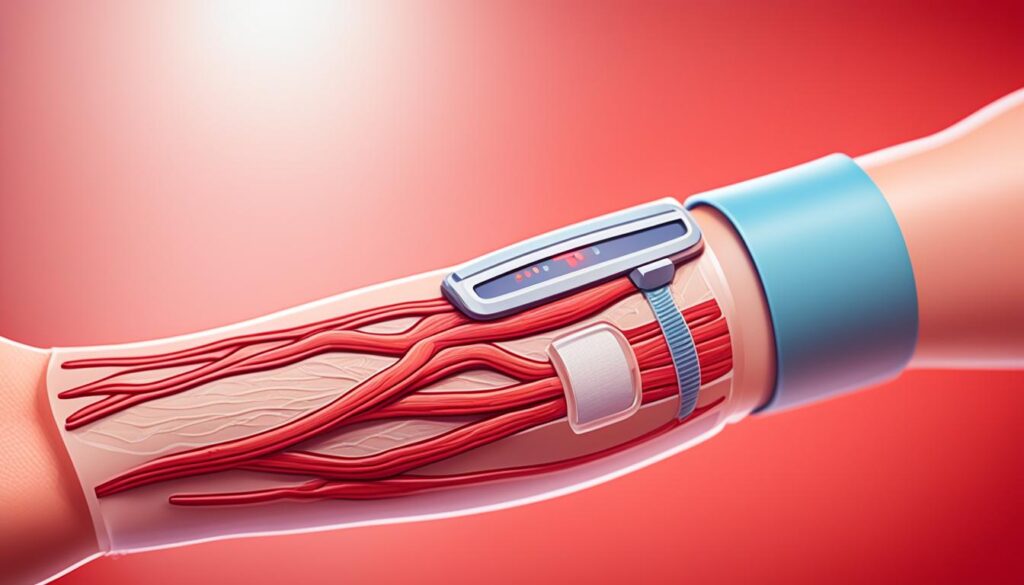Medically reviewed by Dr Chandril Chugh,
Renowned Neurologist and American Trained Specialist
Are you thinking of giving blood for World Blood Donor Day 2024? If you want your donation to go smoothly, it’s best to prepare. This article will walk you through a detailed checklist for before, during, and after your donation.
This checklist helps you greatly contribute to saving lives with blood donation. We’ll cover checking if you can donate, getting yourself ready, picking a good place to donate, and post-donation care. So, let’s make sure you’re fully prepared for the big day.
World Blood Donor Day is very important. It highlights the need for blood donations. Your simple act can truly save lives and leave a lasting mark. Follow our checklist to get started on this life-saving journey!
Understanding the Importance of World Blood Donor Day
World Blood Donor Day is crucial for healthcare and saving lives. It’s celebrated on June 14th. The goal is to highlight the need for safe blood and thank the donors.
This day shows the ongoing need for blood. Sometimes, there’s not enough blood for those who need it. It reminds us of the importance of giving blood for free to help patients.
Donating blood on this day helps a lot of people. It’s something easy to do but it really saves lives. Your donation can offer hope and a new chance for those in medical need.
The work of blood donors on this day is very important. They bring attention to giving blood freely. This ensures there’s enough for all those who need it in health systems.
World Blood Donor Day also shows how much donors are valued. Their selfless actions are key in healthcare. By giving blood, you’re part of a worldwide team that cares about saving lives.
Blood donation is a universal act of kindness. It doesn’t matter where you’re from; giving blood helps anyway. Every donation brings hope and relief to those in crisis.
Now we know why World Blood Donor Day is a big deal. Let’s look at who can donate blood next.
Check Your Eligibility to Donate Blood
Thinking about donating blood? First, check if you can. It’s key to make sure both donors and those getting the blood stay safe. Meeting these rules lets you be a big help and save lives.
Here’s what to think about for your eligibility:
- Age: You’ll usually need to be at least 17 to donate blood. Sometimes, 16 is okay with a parent’s OK.
- Weight: A minimum weight is required, typically about 110 pounds. This weight ensures you can give blood safely.
- Health: You should be healthy, without any infectious illnesses. Avoid giving blood if you have a cold, flu, or have had recent surgery.
- Medications: Let the center know about your meds. Some drugs might mean you can’t donate.
- Travel History: Sometimes, traveling to certain places means you shouldn’t give blood just yet. This is due to possible infections.
- Lifestyle Choices: Recent tattoos or body piercings could pause your blood donation. This rule keeps possible infections low.
- Pregnancy and Childbirth: If you’re pregnant or just had a baby, you’ll need to wait before donating.
Note that rules might change based on where you are or the center. Always check locally or on their website for the rules.
Additional Considerations for Eligibility
A few more points to know for blood donation eligibility:
- Donation Frequency: There’s usually a wait time between donations. Your body needs time to rest and recover.
- Health History: Your past health matters too. Some issues like cancer might mean you can’t give blood.
- Behaviors and Risk Factors: Doing things that up the risk of infections, like IV drug use or risky sex, could affect donating blood. It’s vital to be honest in your health screening.
Have any questions or worries about eligibility? Just give your local blood donation center a call. They’ll have the latest info and can help you through the process.

Prepare Yourself for Blood Donation
Getting ready for blood donation involves both physical and mental preparation. These steps and advice will make sure you are set for the donation.
Eat Nutritious Meals
It’s crucial to fuel your body with healthy food before giving blood. Eat meals that are full of iron, protein, and vitamins. This boosts the nutrients you need for the blood donation.
Stay Hydrated
Before donating, drink lots of water and other non-alcoholic drinks. Staying away from caffeine and alcohol for a day helps too. This keeps your body in good shape for giving blood.
Get a Good Night’s Sleep
Rest is vital before you give blood. Aim for a solid night’s sleep. This ensures you’re alert and ready on donation day.
Wear Comfortable Clothing
Choose comfortable, loose clothes on donation day. It makes accessing your arm easier. Tight clothing can block blood flow and cause issues.
Relax and Stay Calm
It’s key to be mentally prepared for blood donation. Breathing exercises and calming activities can help. They lower stress and improve your donation experience.
These tips ready your body and mind for donating blood. Looking after yourself makes the donation experience better. It also helps the people who will receive your blood.
| Benefits of Preparation | Tips for Preparation |
|---|---|
| Enhanced donation experience | Eat nutritious meals |
| Reduced anxiety | Stay hydrated |
| Promotes quick recovery | Get a good night’s sleep |
| Smooth donation process | Wear comfortable clothing |
| Contributes to the well-being of recipients | Relax and stay calm |
Find a Reputable Blood Donation Center
Choosing a good blood donation center is key to a positive, safe experience. You should pick one that has good hygiene and safety standards. Here’s how to find a good one:
1. Research
Start your search by looking into various blood donation centers. Find ones known for their great service and possibly even location. Websites and social platforms can be great for this. They often have feedback from people who’ve donated there before.
2. Accreditation
Make sure the center has the right accreditations from health authorities. This means they follow strict rules for collecting and storing blood. Watch out for affiliations with groups like the American Red Cross or the AABB.
3. Safety Measures
It’s important that the center puts safety first. They should be using clean equipment and disposable needles. If a place is neat and well-kept, it’s a good sign they care about safety.
4. Testing and Screening
Ask about how they check the donated blood. The best centers will screen donors to make sure their blood is safe. They test for diseases like HIV and hepatitis to keep recipients safe.
5. Transparency
A good center will tell you everything you should know about donating blood. They should be ready to answer your questions. They will also offer information on what to expect before, during, and after your donation.
Follow these tips to pick a quality blood donation center. Choosing well can make donating blood a great experience. After all, donating blood is a wonderful way to help save lives.

Gather Required Documentation
Before you visit the blood donation center, make sure you have the right documents. This will make the process easier. Having these documents will help with the sign-up and donation process. Here’s what you need to bring and what to know for your area:
Documents to Bring:
- Identification Proof: Bring a government ID like a passport or driver’s license.
- Proof of Age: You might need this, especially if you’re young or donating for the first time.
- Health History Form: You’ll fill out a form about your health. Know your medical history and medications to fill it out quickly.
- Previous Donation Records: If you’ve given blood before, bring any records or cards. This helps the staff understand your donation history.
Additional Requirements:
Keep in mind, different places might have extra rules. Things like your age, recent travel, health, or surgeries can affect this. Check your local center’s website or call them to be sure of what’s needed in your area.
Get all your documents ready to save time. Your donation is important and can save lives. So, get prepared to have a smooth donation day and help those in need!
Take Care of Yourself After Donating Blood
After giving blood, it’s important to focus on getting better. Follow these steps for a healthy recovery. This will make things easier and faster for you.
1. Rest and Rehydrate
Taking it easy is vital after blood donation. Avoid hard work for the day. Drink lots of water to help your body get back to normal. Rehydrating is key to feeling better.
2. Eat Nutritious Meals
Eating well helps your body heal after giving blood. Foods with iron are great, like dark greens and meats. Add fruits and veggies to keep your immune system strong.
3. Avoid Alcohol and Caffeine
Stay away from alcohol and caffeine for a day after you donate. They can make you more dehydrated. This could slow down your recovery.
4. Take Care of the Donation Site
Caring for where you donated is crucial. Keep it clean and dry. Don’t use any lotions on it. If it bleeds too much or hurts, call the center or see a doctor.
5. Monitor Your Body
Listen to what your body tells you post-donation. Feeling a bit tired and dizzy is normal. Yet, if issues like feeling faint or serious pain happen, get help right away.
Looking after yourself is key after donating blood. It means you help more because you’re healthier. Stick to these steps to also have a better World Blood Donor Day experience.

Spread Awareness and Encourage Others to Donate
Donating blood saves lives and makes a big difference for those in need. By telling people about it and asking them to join in, you’re helping keep blood supplies steady. Here are ways to show why blood donation matters and get others to help:
- Organize community blood drives: Work with your town, school, or group to set up blood drives. These events bring people together to donate easily and safely.
- Utilize social media platforms: Use platforms like Facebook and Instagram to talk about blood donation. You can share facts, stories, and data to inspire your circle to give.
- Collaborate with influencers and organizations: Team up with experts and groups who care about health issues. Together, your message can reach more people, getting more to think about donating blood.
- Host educational workshops: Hold talks in schools or offices to teach folks about donating blood, its good points, and who can donate. Clear up any myths and worries too.
- Share personal experiences: If you’ve given blood, share how it felt and why you did it. Your story might move others to do the same, creating a shared feeling of helping out.
Every step, no matter how little, does a lot of good. By talking up blood donation and asking others to join, you’re a part of saving lives. And that’s a big deal in your hometown.
Encourage others to get with it and share the good word about blood donation.
| Ways to Spread Awareness and Encourage Blood Donation |
|---|
| Organize community blood drives |
| Utilize social media platforms |
| Collaborate with influencers and organizations |
| Host educational workshops |
| Share personal experiences |
Conclusion
We’ve given you a detailed list to help you get ready for World Blood Donor Day 2024. Following this guide will let you make a real change. You’ll help save lives by giving blood.
Donating blood is all about giving. It can really help someone who is in need. Make sure you’re fit, know where to donate, have the right papers, and look after yourself afterwards. This will make giving blood a smooth ride.
Tell everyone why giving blood matters. Try to get more people involved. With more donors, we can offer hope to many. So, join in and be proud of what you can do!
FAQ
What is World Blood Donor Day?
World Blood Donor Day takes place every June 14th. Its goal is to tell people why giving blood matters. It also celebrates those who donate blood to help others.
Why is World Blood Donor Day important?
This day is crucial. It reminds us how vital safe blood is for life-saving procedures. It also praises the kind-hearted people who freely give their blood to save strangers.
How can I check my eligibility to donate blood?
Make sure you fit the bill for donating blood by looking at the requirements. These usually cover your age, health, and recent travels. It’s also smart to talk to your doctor.
How should I prepare myself for blood donation?
Ready yourself to donate blood by resting well and eating before you go. Stay away from alcohol and caffeine that day. Wear something comfy and have your ID handy.
How can I find a reputable blood donation center?
For a good place to give blood, check the American Red Cross or your local blood bank online. You can also ask your doctor or friends who have donated for suggestions.
What documentation do I need for blood donation?
The paperwork you need to donate blood can differ based on where you are. In most cases, just a photo ID, like a driver’s license or passport, is enough. It’s wise to call ahead to confirm what else they might need.
How should I take care of myself after donating blood?
Post-donation, get plenty of rest and drink fluids. Stay away from tiring activities and lift nothing heavy. A meal filled with iron will help your body bounce back.
How can I spread awareness and encourage others to donate blood?
Raise awareness for blood donation by talking about it on social media, setting up events, or simply teaching others. Inspire your loved ones and community to join you in this life-saving cause.















Leave a Comment